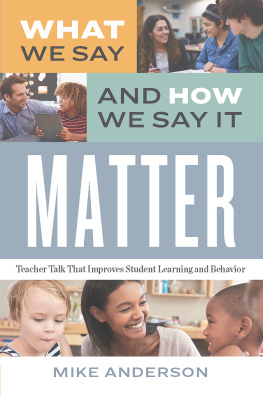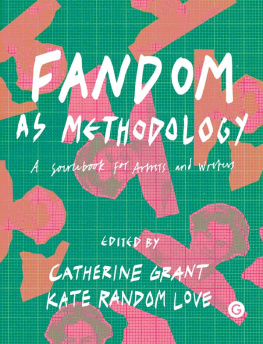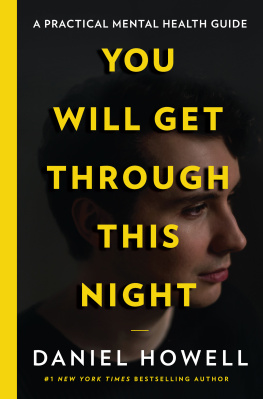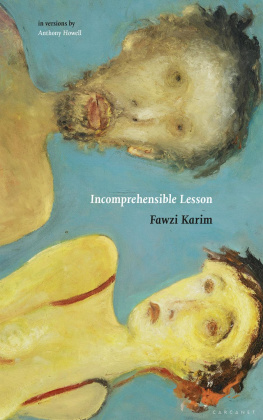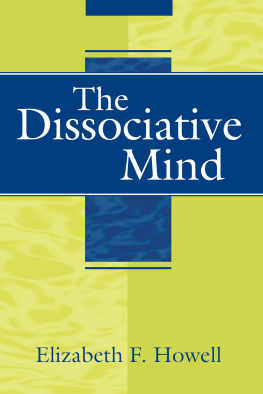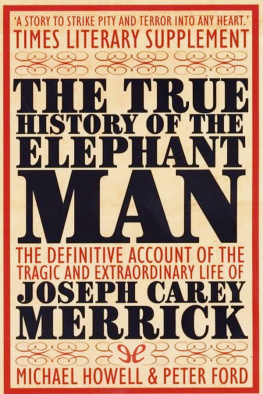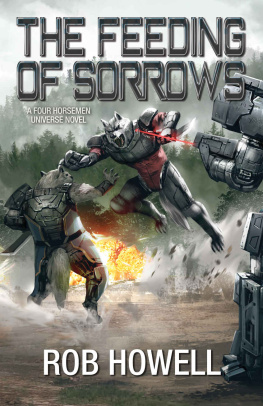FANDOM AS CLASSROOM PRACTICE
FANDOM & CULTURE
Katherine Larsen and Paul Booth, series editors
FANDOM AS CLASSROOM PRACTICE
A TEACHING GUIDE
Edited by
KATHERINE ANDERSON HOWELL
UNIVERSITY OF IOWA PRESS,
IOWA CITY
University of Iowa Press, Iowa City 52242
Copyright 2018 by the University of Iowa Press
www.uipress.uiowa.edu
Printed in the United States of America
Design by Kristina Kachele Design, llc
No part of this book may be reproduced or used in any form or by any means without permission in writing from the publisher. All reasonable steps have been taken to contact copyright holders of material used in this book. The publisher would be pleased to make suitable arrangements with any whom it has not been possible to reach.
The University of Iowa Press is a member of Green Press Initiative and is committed to preserving natural resources.
Printed on acid-free paper
Library of Congress Cataloging-in-Publication Data
Names: Howell, Katherine Anderson, 1981 editor.
Title: Fandom in the classroom practice / edited by Katherine Anderson Howell.
Description: Iowa City : University of Iowa Press, [2018] | Series: Fandom & Culture | Includes bibliographical references and index.
Identifiers: LCCN 2017040591 (print) | LCCN 2017060665 (ebook) | ISBN 9781609385682 (ebk) | ISBN 9781609385675 (pbk. : acid-free paper)
Subjects: LCSH: EducationSocial aspects. | Popular cultureStudy and teaching. | Mass media in education. | Fans (Persons)
Classification: LCC LC191 (ebook) | LCC LC191 .F27 2018 (print) | DDC 306.43dc23
LC record available at https://lccn.loc.gov/2017040591
CONTENTS
Katherine Anderson Howell
Anna Smol
Rebecca Power
Maura Grady, Richard J. Robby Roberson Jr., and Erika Gallion
Leslie Leonard and Lee Hibbard
Lingzi Yuan and Yixian Yang
Mattias Aronsson, Anneli Fjordevik, and Hiroko Inose
Shannon K. Farley
John Sanders
Rukmini Pande
Paul Booth
Ashlyn Keefe
ACKNOWLEDGMENTS
This book went from idea to reality because of the concerted support of many people. They all share my immense gratitude.
First, my thanks go to Catherine Cocks, the original editor of this volume, who first asked Would you like to edit a book? Her guidance, thoughtfulness, and patience have been invaluable. I am also grateful to the University of Iowa Press for its commitment to the volume and for Ranjit Arab, who shepherded the book to the finish line.
It is fair to say that this volume would not have been possible without the gentle, caring work of the teachers at Bright Start Childcare, the day care center at which both of my children spent time during the writing and editing of this book. My academic labors are not possible without these teachers labors. Thank you to Evelyn Garcia, Omelia Molina, Joselyn Castellanos, Ana Lopez, Honorata De Jesus, Ileana Torres, Anna Liza Abad, Walime Kontou Djeri, Dodji Shalley, Veronica Wright, and Marcia St. Hilaire-Finn.
Thank you to the University Writing Program at George Washington University, which supports the research pursuits of its adjuncts, especially Rachel Riedner, Zachary Wolfe, Sandra Freidman, and Heather Schell. Thank you to my office mates through the creation of this volume, including Brian Fitzpatrick, Edward Helfers, and Allison Sparks. Sorry I talk to myself when I write! Thank you to the students who challenged me and did amazing, creative work in my class, especially Brianna Gardner and Christiana Miller. Thank you to Joseph Fisher, who asked key questions. Thank you to Susan McMenamin, the director of Disability Support Services at George Washington University, who gave me the space to finish this volume as I moved from faculty to staff.
Thank you to my husband, John Eric Howell, for his support, and to my children, Luke and Samuel Howell, for not mashing the wrong keys on the keyboard and erasing the manuscript. I love you all.
Finally, I am deeply grateful for the friendship and mentorship of Katherine Larsen, my colleague at George Washington University. Her guidance and expertise have shaped my work in countless ways. Kathy set me down the remix path and has been a tireless sounding board ever since I first darkened her office door looking for a particular article. This book is dedicated to her.
INTRODUCTION
Invitation: Remix Pedagogy in the Fandom Classroom
Katherine Anderson Howell
But then, as we went through the whole writing process and learned how to choose a topic and figure out what we were interested in, I realized I could explore the relationship.
Priyadharshini Seetharaman
As fan studies grows as a disciplinetesting its ethical and disciplinary boundaries, considering the role of the acafan, and expanding and blurring its definitions of fandomteaching of and with fandom is growing in prominence. Teaching fandom, or teaching the discipline of fan studies, implicitly involves teaching the methods that fans use when they respond to media texts as well as teaching the ways that fan scholars explore and analyze fans and fandom. Instructors of all disciplines are taking teaching lessons from fans: the ways that fans create can provide models for students in the academic classroom.
Stedman (2012, 108) describes the interactions between fan creations (videos, music, and fan fiction) and the audience for such art as becom[ing] inherently more dialogic, responsive, and messy. The audienceprimarily other members of the same [fan] communityhave already formed opinions about the... original texts and respond to the new creation in ways informed by that text, learning as they do to find the subgroups of opinions in the community. The connections to academic disciplines and their own internal conversations may be clear, but it is important not to overlook the parallels to the classroom. Students in a given course form opinions about the course readings and then respond to one another in classroom conversations based on those opinions. Fan creations and communities provide a way to navigate and encourage messy classroom dialogue.
Stedmans study of fans focuses on their composition methods and on the creativity of their work: in the wider culture, creativity that is obviously based on earlier work is often derided as less meaningful than work seen as wholly original. However, as Stedman points out, serious work goes into creating this art: the development of community ethics and a sense of authorship and ownership over their own creations; the use of rhetorical principles necessary to nearly any act of composition (genre, audience, and purpose); research driven by excitement and curiosity; the drive to find new possibilities and skills; and the capacity to critique culture (2012, 11217). These are the kinds of things we mean when we talk about teaching fandom, or teaching using fan methods.
In cultures saturated with media, fans authorize themselves to critically respond and engage with their chosen texts; they do not rely on the authority of the classroom, a theory, or a degree to open the door for their response. Jenkins (2010) describes this as an act of citizenship, and like many other kinds of citizenship (e.g., activism, public writing, community contribution, and collaboration), fan methods can authorize postsecondary students to respond and engage in an academic world saturated with gatekeeping, jargon, and required curricula. Particularly since they transform their source material, fan methods of creating offer students a way to think about using research to build their own ideas.



